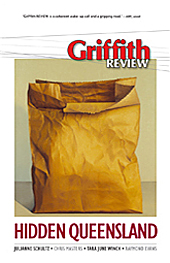Featured in

Buy
$19.95
- Published 20080902
- ISBN: 9780733322839
- Extent: 296 pp
- Paperback (234 x 153mm)

Already a subscriber? Sign in here
If you are an educator or student wishing to access content for study purposes please contact us at griffithreview@griffith.edu.au
Share article
More from author

Cities of money
EssaySYDNEY 2008: TO make it to the offices of a project team at Macquarie Capital in Sydney's Martin Place, you must pass a security...
More from this edition

Scratch the Surface – Nude Queensland
ReportageIf I tell you I am sitting on a balcony typing these words in the glorious Queensland sun, you will possibly be envious. If...

Disruptive influences
EssayThe present is a hinge on which the past and the future swing. – Raymond Evans[i] FOR THOSE TOUCHED by the perverse blessing of a youth...

Falling to earth
MemoirGRACE DIED THIS March , in her ninety-ninth year. We had been willing her towards the big one hundred, urging her on. For myself,...
Stay up to date with the latest, news, articles and special offers from Griffith Review.